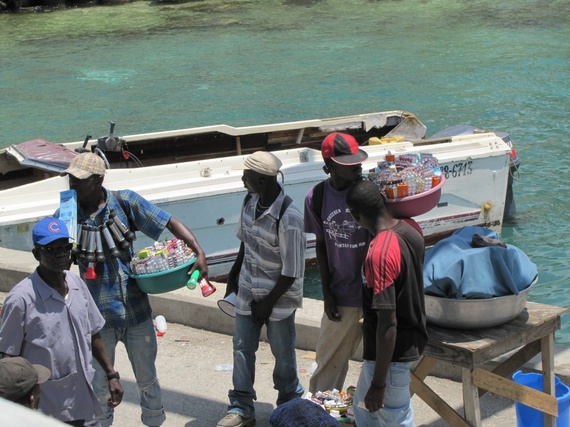Ambulatory pharmaceutical sellers in Haiti (photograph by Allison Bland)
Recent reports illuminate a growing black market trade in blood from Ebola survivors. Those with the desire and resources are buying blood in hopes of curing current infections or stockpiling for future infections. In addition, derivatives of blood-based antibodies are the main ingredients in experimental serums used to treat American, Spanish, and Liberian medical officials. It is also important to note that blood serum from animals is harvested and engineered using different technologies to produce experimental serums. While research on Ebola serums is being expedited as much as possible to respond to the rising demand, no proven Ebola cure exists. In fact, while the two Americans and a couple of Liberian doctors who received the serum survived, another Spanish doctor and a Liberian doctor did not. Administered early and with a high level of medical intervention, serums such as ZMAPP may help lower the mortality rate for Ebola. However, data is insufficient at this stage. In the case of Richard Sacra, U.S.-based physician Kent Brantly donated his personal blood to help fight off the virus. These developments highlight a larger market of pharmaceuticals, treatments, and biological material. The commodification of blood and other bodily fluids is steadily rising, and it is important to consider the practices surrounding these growing trends.
Procedures and policy in progress raise a number of questions about the ethics surrounding blood donation and sale. Why is it illegal for a Liberian citizen, for example, to procure blood as a preventative measure from a neighbor who survived Ebola? Conversely, why is it legal for Kent Brantly to give his blood to Richard Sacra to treat Ebola? Are these conditions due to location or nationality, or are there other issues at play? In the West, especially in the United States, most medical interventions are highly clinical. Perhaps this growing clinicalization of the treatment of bodies in life and death also extends to the use of experimental treatments. Or, more disturbing, is it a fascination in how black bodies are treated and controlled? In the United States, in comparison, a significant trade in human milk and sperm exists in private, parallel networks and online websites. The USDA cannot ensure the safety of breast milk and seminal fluid purchased from individuals online, and neither can the consumer.
Like blood from former Ebola patients, seminal fluid and breast milk have the propensity of containing harmful viruses and bacteria. Yes, some of the sellers provide certificates of health, but are these always verifiable? There are considerable risks in consuming unregulated breast milk and insemination from independent sperm donors. In addition, a baby can drink formula instead of breast milk to survive, and a couple or an uncoupled parent can seek other alternatives for reproduction. Someone faced with Ebola has a 60- to 70-percent chance of dying in most instances. Given these risks, the probability of dying or becoming ill from unregulated blood may be lower than dying from untreated Ebola.
Globally, illegally traded and counterfeit pharmaceuticals generate more than $75 billion USD annually. Some of the most widely traded drugs in the Global South are drugs used to treat tropical disease like malaria and emerging "diseases of affluence" like diabetes. In the Global North, it's widely counterfeited drugs include Lipitor, Viagra, and Tamiflu. Recently, counterfeit Oxycontin sale and drug busts have been gaining a lot of press throughout the United States. Just as black market sales of Tamiflu rise when the flu season spikes, it should be expected that blood from Ebola survivors and palliative pharmaceuticals would be added to this trade.
In addition to the Internet-driven parallel trade in pharmaceuticals and fluids, one often finds in other parts of the world other forms of parallel markets. This is especially the case in parts of the Global South. In Africa, in particular, pharmaceuticals and other biomedical products are often sold by ambulatory sellers in neighborhoods, at transit points, or in established markets like those found in Nigeria and Senegal. In Senegal, the trade is more than $20 million USD a year, while some countries have much bigger markets.
In sum, yes, it is important that consumers and patients know the origin and safety of the drugs and material used for consumption and treatment. Public safety is important, and there are potentially harmful risks using unregulated blood for Ebola efficacy. At the same time, we need to think about the narratives regarding the distribution of bodily fluids and how the narratives are framed depending on type and location. One method to potentially regulate parallel trades in blood from Ebola survivors is to provide quick test for common blood-borne diseases. These tests could potentially be in kits that USAID and others are giving to households in Ebola-affected countries. This test would not likely be as comprehensive as one conducted in a clinical lab, but it would provide some protection.
